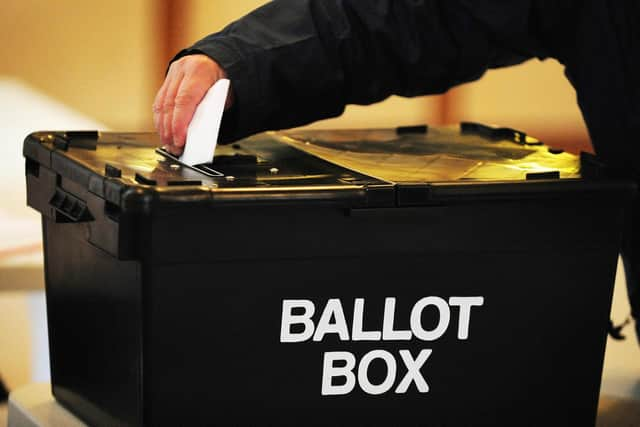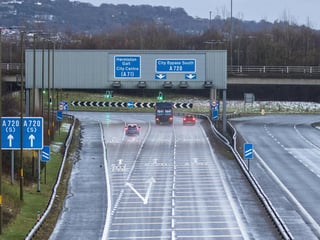Analysis: Will Covid scupper the Scottish Parliament elections this May?
First Minister Nicola Sturgeon has said she can “see no reason at this stage” why the May 6 election shouldn’t go ahead and that “everybody would agree it’s really important that our democratic processes continue and that elections happen”.
However, with calls for the government to have a “laser focus" on tackling the pandemic, some opposition MSPs have already suggested the vote should be postponed. So is this likely to happen?
Opposition to a May poll


Advertisement
Hide AdAdvertisement
Hide AdThe main issue for those concerned about holding the vote is the distraction of party politics when a life-threatening virus is affecting the population.
Scottish Labour’s rural economy spokesman Colin Smyth has said “it would be completely inappropriate” for politicians “to be running about trying to get people’s votes” as the focus should be on the pandemic.
He has pointed to the one-month delay to the 2001 UK general election because of the foot-and-mouth disease outbreak, and suggested a similar postponement to the Holyrood vote.
Political researcher and former Labour candidate, Martin McCluskey, has said holding the vote in May is “risky”.
Craig Harrow, a former vice-president of the Liberal Democrats, has also raised concerns, saying: “Serious consideration should be given to postponing the Scottish Parliament election, ensuring that the whole focus of the Scottish Government is on dealing with the pandemic and rolling out the vaccine rather than electioneering.”
However, other MSPs have accepted while knocking on doors to garner votes or holding real-life hustings events would not be the most sensible of options given on-going restrictions, Zoom and other online tools could be easily used for campaigning.
Contingency legislation
The Scottish Parliament has already introduced legislation to attempt to deal with any potential election postponement.
The Scottish General Election (Coronavirus) Bill was passed just last month, setting out alternative options for the election should changes need to be made – changes which would need to be agreed on a cross-party basis and with the Parliament's Presiding Officer (PO). Indeed, the PO has the power to agree a delay of up to six months.
Advertisement
Hide AdAdvertisement
Hide AdThe Bill also allowed, in the event the election is forced to be delayed or deferred, for the dissolution of Parliament to move from March 25 to May 5 to ensure MSPs can pass emergency legislation to delay the election if necessary.
The legislation also allows for the vote to be held over more than one day to help with social distancing and potential queues at polling stations. However, the Electoral Management Board Scotland (EMBS) has said it does not believe this will be needed if proper preparations are made, and that polling over multiple days “introduces additional risk, cost and potential confusion for the voter”.
Malcolm Burr, convener of the EMBS, has already told local authority Returning Officers (ROs) he may “consider a direction limiting the number of voters allocated to each polling station to minimise the risk of queues given the implication of physical distancing in polling places" and has told RO’s to review polling places and have this complete by February.
He has pointed to the 2014 independence referendum in terms of how ROs ensured there were no major queues at polling stations, by limiting the number of voters allocated to each polling station to 800. He has said voters should prepare to plan their visit and be prepared for a short wait.
“While the referendum saw the largest turnout ever experienced in most areas – 84.6 per cent overall – there were no reports of significant queues,” he said.
Mr Burr said in eight council by-elections through October and November there was physical distancing, enhanced hygiene with poll staff behind perspex screens or wearing visors, and each voter issued with their own pencil.
“The by-elections demonstrate that polling in a day is possible under coronavirus conditions,” he said.
That analysis showed the number of voters that each polling station can accommodate in a day with no queues is 500.
Advertisement
Hide AdAdvertisement
Hide AdBoth the EMB and Electoral Commission are holding a seminar with ROs about election “readiness” in February.
What about a purely postal vote election?
Postal voting has been a growing trend in Holyrood elections. Registration was at 3.6 per cent in 2003, 11.2 per cent in 2007, 14.1 per cent in 2011, and 17.7 per cent in 2016, and currently 17.1 per cent of the electorate is signed up for a postal ballot in 2021.
However, election officials are expecting a rush once campaigns start and believe around 38 per cent of voters will request to cast a ballot through the mail, which would equate to about 2.8 million postal ballots – two million more than were issued at the Scottish Parliament election in 2016.
The new legislation allows for voters to have three weeks longer to submit applications for postal ballots – and ministers could decide the election could become a postal-only vote, but that would require a major delay to allow everyone to apply for a vote, pushing the election to later in the year.
So will the election go ahead?Barring any unforeseen escalation of the spread of the virus, or a collapse in the vaccination programme, it is difficult to see why the Holyrood election would not go ahead as things stand.
Minister for Parliamentary Business Graeme Dey certainly believes it will. “We fully expect the Scottish Parliament election to go ahead as planned in May, but it is prudent and responsible to ensure we have planned for every eventuality so that the poll can be conducted safely and fairly during this pandemic,” he said.
A message from the Editor:Thank you for reading this article. We're more reliant on your support than ever as the shift in consumer habits brought about by Coronavirus impacts our advertisers.
If you haven't already, please consider supporting our trusted, fact-checked journalism by taking out a digital subscription.
Comments
Want to join the conversation? Please or to comment on this article.
